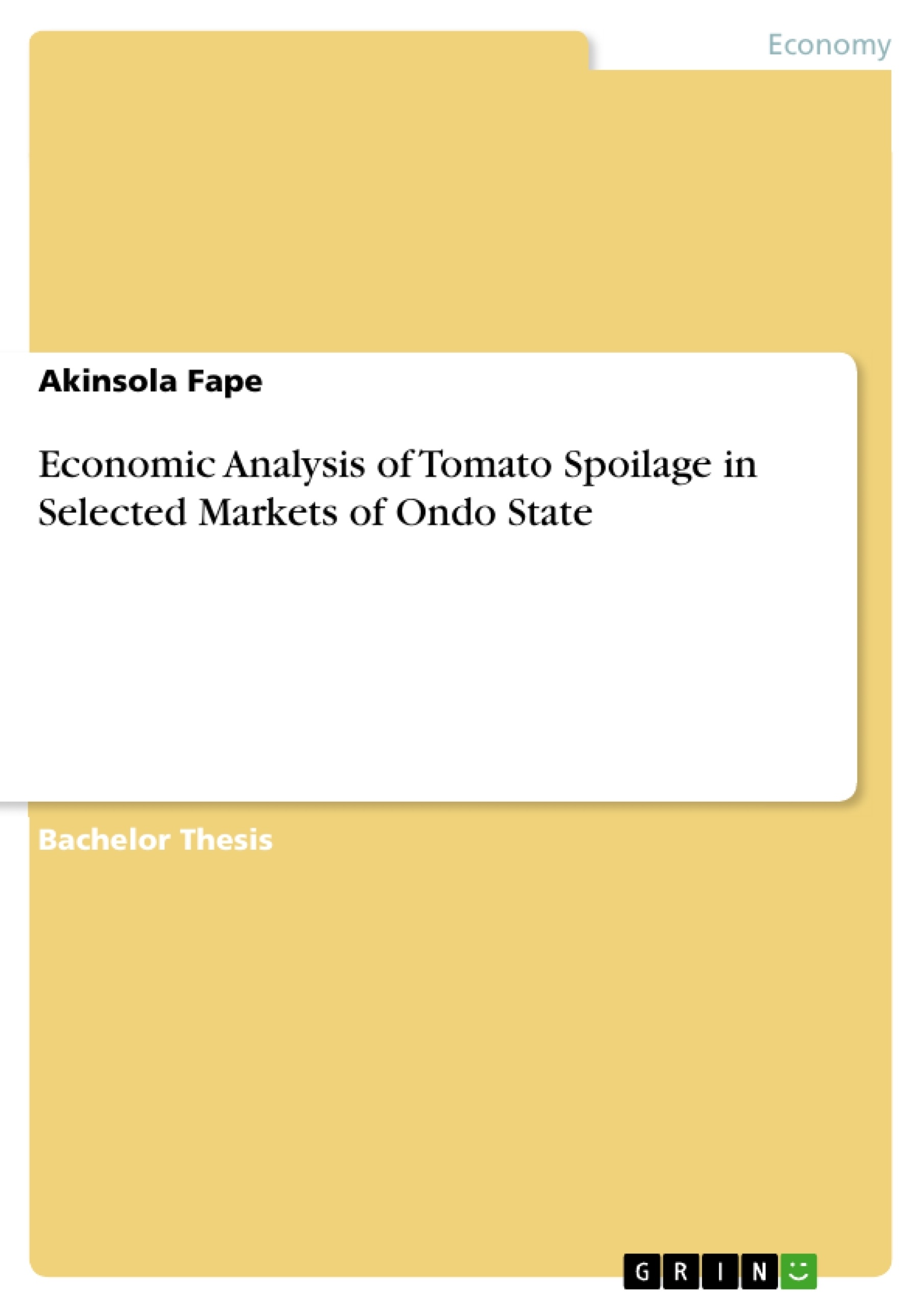This study examined the economic analysis of tomato spoilage in selected markets of Ondo State. The study was carried out in Akure South, Akure North, Owo and Ondo West Local Government Areas (LGAs) of Ondo State, Nigeria. The specific objectives of this study were to: describe the socioeconomic characteristics of tomato marketers in the selected markets, identify factors that cause tomato spoilage, examine the methods used by tomato marketers in minimizing tomato spoilage, and estimate the amount of loss due to spoilage in the selected markets. A total of eighty (80) respondents were selected for the study through the use of multistage sampling procedure. Data collected were analysed using descriptive statistics and formulae for calculating losses associated with spoilage.
The study shows that 35% of the marketers were male and 65% were female, the largest percentage (27.5) of the marketers fell in age group 30-39 and 40-49 years. About 53.75% of the marketers source their capital through personal savings. Only 16.25% of the marketers were illiterate while the remaining 83.75% attended at least primary school and this made little arithmetic to be easily done. The main cause of tomato spoilage was attributed to impact damage (especially collision during transportation due to bad roads) as seventy seven (77) of the marketers affirm this. The main spoilage reduction method adopted by the marketers was proper sorting of the tomato, seventy six (76) of the marketers affirm this. The average loss due to spoilage was estimated as follows; Percentage loss was 16.05%, Quantitative loss was 22.24Kg and Economic loss was N2,396.04. The main problem encountered by the marketers was loss. Therefore, a lot of tomatoes were lost to spoilage due to impact damage and hence it is recommended to reduce spoilage level by establishing tomato processing industries in Ondo State.
Inhaltsverzeichnis (Table of Contents)
- CHAPTER ONE
- 1.0 INTRODUCTION
- 1.1 Background Information of the Study
- 1.2 Relevance of Economic Analysis of Tomato Spoilage
- 1.3 Problem Statement
- 1.4 Research Questions
- 1.5 Objectives of the Study
- 1.6 Justification for the Study
- CHAPTER TWO
- 2.0 LITERATURE REVIEW
- 2.1 Theoretical Framework
- 2.1.1 Tomato Spoilage
- 2.2 Empirical Literature Review
- 2.2.1 General Characteristics of Tomato Markets in Africa and Nigeria
- 2.2.2 Reduction in Market Price of Tomato
Zielsetzung und Themenschwerpunkte (Objectives and Key Themes)
This study examines the economic implications of tomato spoilage in selected markets in Ondo State, Nigeria. The research aims to understand the socioeconomic characteristics of tomato marketers, identify the factors contributing to spoilage, analyze the methods employed by marketers to minimize spoilage, and estimate the economic losses incurred due to spoilage.
- Socioeconomic characteristics of tomato marketers in Ondo State
- Factors contributing to tomato spoilage
- Methods used by tomato marketers to minimize spoilage
- Economic losses associated with tomato spoilage
- Recommendations for reducing tomato spoilage
Zusammenfassung der Kapitel (Chapter Summaries)
Chapter One introduces the research topic, outlining the background information, relevance, problem statement, research questions, objectives, and justification for the study. Chapter Two provides a comprehensive literature review, covering both theoretical frameworks and empirical studies related to tomato spoilage, the characteristics of tomato markets in Africa and Nigeria, and the reduction in market prices of tomatoes. The review examines the various causes of tomato spoilage and explores strategies for minimizing losses.
Schlüsselwörter (Keywords)
The study focuses on tomato spoilage, economic analysis, market characteristics, socioeconomic factors, spoilage reduction methods, economic losses, and tomato processing industries in Ondo State, Nigeria.
- Arbeit zitieren
- Bachelor's Degree Akinsola Fape (Autor:in), 2017, Economic Analysis of Tomato Spoilage in Selected Markets of Ondo State, München, GRIN Verlag, https://www.grin.com/document/920689



